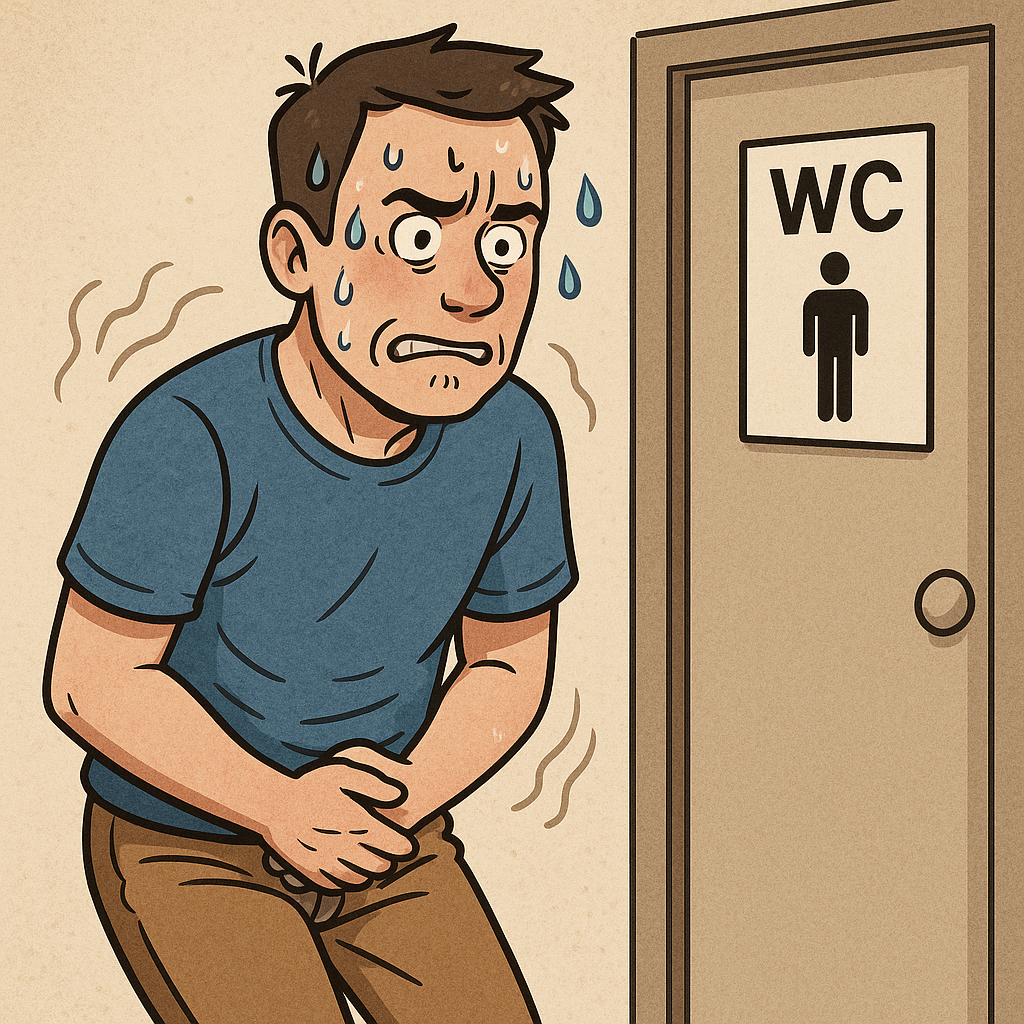Overcome Fecal Urgency: Pelvic PT for Lasting Bowel Control
When “I Have to Go” Means Right Now
If you have ever been out running errands or sitting in a meeting and felt an overwhelming need to have a bowel movement immediately that makes you sweat, you know how disruptive fecal urgency can be. For many, it is more than inconvenient. It is exhausting, stressful, and comes with the fear of not making it to the bathroom in time.
Fecal urgency is common but it is not normal. You can take steps to address it. One of the most effective, research-supported, and non-invasive solutions is pelvic floor physical therapy.
Why Fecal Urgency Happens
Bowel urgency can develop for many reasons, but one of the most common is pelvic floor muscle dysfunction combined with changes in bowel motility. The pelvic floor muscles play a crucial role in supporting the rectum and controlling the release of stool.
When these muscles are weak, overly tight, or poorly coordinated, the body can lose the ability to delay a bowel movement until the time is right.
Potential causes include:
Weakness after childbirth or surgery
Nerve injury from childbirth, diabetes, or pelvic trauma
Long-term constipation or diarrhea
Anal sphincter injury
Muscle changes related to aging
When nature calls and the bathroom isn’t free… fecal urgency is real and more common than you think. Pelvic floor physical therapy can help bring relief.
How It Impacts Your Life
People living with fecal urgency often start rearranging their lives to manage symptoms. This might include avoiding travel, skipping meals, or only attending events where bathroom access is easy. Others wear pads or liners for security. Many keep a mental map of public restrooms wherever they go.
Over time, this can lead to social withdrawal, increased anxiety, and a significant decrease in quality of life. Taking steps early can prevent the problem from worsening and can help you regain confidence in daily activities.
How Pelvic Floor Physical Therapy Helps
Pelvic floor therapy is one of the most effective, proven methods to restore bowel control without medications or surgery. As a dual board-certified pelvic health physical therapist, I have worked with many patients who went from living in constant bathroom anxiety to feeling in control again.
Here is what you can expect in pelvic PT:
Comprehensive Evaluation
We assess pelvic floor strength, coordination, and flexibility. We also evaluate posture, breathing, and core muscle function since these factors affect bowel control.Pelvic Floor Muscle Training
This includes strengthening weak muscles so they can hold stool for longer periods and improving timing so the muscles contract and relax exactly when needed.Rectal Sensory Training
We work on helping the body recognize the sensation of stool and distinguish between true urgency and confusing signals.Optimizing Bowel Routines
You will learn how to have predictable and complete bowel movements. We address diet, hydration, and bathroom habits that influence bowel health.Breath and Core Integration
Diaphragmatic breathing techniques help calm urgency signals. Coordinating the pelvic floor with the core muscles reduces strain during bowel movements.
Simple Steps You Can Try Today
Although a personalized plan from a pelvic PT is best, there are small changes you can start making now.
Keep a bowel diary to track diet, bathroom times, and urgency episodes.
Drink adequate water daily since dehydration can make stool harder and urgency worse.
Avoid “just in case” bathroom trips, which can train your bowel to signal too early.
Why This Approach Works
Pelvic PT treats the underlying cause of urgency rather than only managing the symptom. Instead of relying on medications that may mask the issue or procedures that carry risks, pelvic PT retrains your body to function correctly.
Research supports that targeted pelvic floor muscle training combined with bowel habit retraining can significantly reduce urgency episodes. Many patients see improvements within a few weeks and continue to progress over time.
Real Results Happen Every Day
I have worked with patients who avoid leaving their homes, stop going on vacations, or no longer hang out with friends due to their fear of an accident. After pelvic PT, they now travel, attend events, and live without the constant need to know where the nearest restroom is. Some have reduced or eliminated the need for pads entirely. Others have regained confidence in social and work settings.
You do not need to accept fecal urgency as part of your life. With the right plan, you can regain control and live without constant bathroom anxiety.
Taking the Next Step
If you are dealing with fecal urgency, starting pelvic floor physical therapy as soon as possible can lead to better outcomes. The sooner you begin, the sooner you can experience relief and confidence.
Schedule an evaluation to discuss your symptoms and create a plan designed specifically for your needs. You deserve to live your life without the constant stress of urgency controlling your choices.
Key Points to Remember
Fecal urgency is common but not normal.
Pelvic floor dysfunction is a major cause and can be addressed.
Pelvic PT is non-invasive, evidence-based, and personalized.
You can retrain your muscles and habits for lasting bowel control.
Your bathroom habits should not control your life. Pelvic floor therapy can help you take control again.
Written By,
Dr. Jana Richardson, PT, DPT, WCS, PRPC, CIDN
Dual Board-Certified Pelvic Floor Therapist, Owner of Chicago Pelvic Health, and Director of the Male Health Special Interest Group for the APTA Pelvic Health Section
Dr. Jana Richardson is a highly accomplished pelvic floor therapist with dual board certifications and extensive experience in treating complex pelvic floor dysfunctions. As the owner of Chicago Pelvic Health, Dr. Richardson is dedicated to providing personalized and effective care for her patients. She holds a Doctorate in Physical Therapy and advanced board certifications in Women’s Health (WCS) and Pelvic Rehabilitation (PRPC), positioning her as a leading expert in her field.
Dr. Richardson is also certified in Integrative Dry Needling (CIDN), allowing her to deliver comprehensive and targeted treatment strategies. In addition to her clinical work, she has been elected as the 2026 Director of the Male Health Special Interest Group for the APTA Pelvic Health Section, where she advocates for advancing male pelvic health care nationwide. Her commitment to patient-centered care and her passion for helping individuals achieve optimal pelvic health make her an invaluable resource to the community and her profession.

